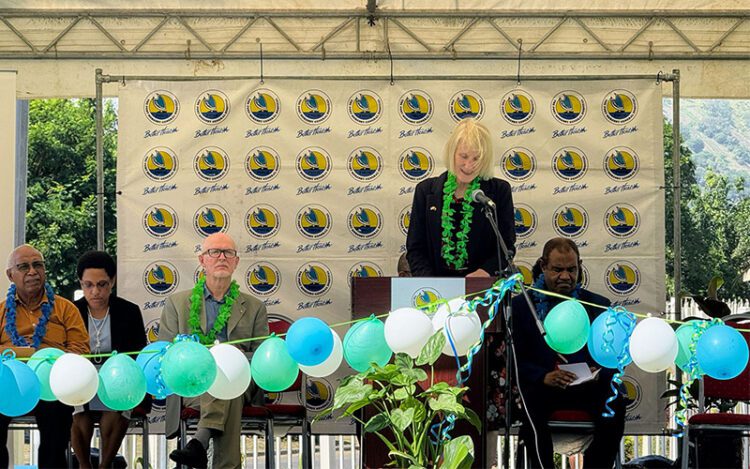The British High Commissioner, Her Excellency Ms Anne Macro, visited Port Moresby General Hospital in Papua New Guinea today to officially re-open both its own microbiology laboratory and the Central Public Health Laboratory.
The laboratories were refurbished under the British Government’s Flemming Fund Country Grant, with Burnet Institute as the grantee.
The Fleming Fund is a UK Aid program designed to help tackle antimicrobial resistance (AMR) in Africa and Asia by increasing understanding of how AMR is spreading and where it poses the greatest risk.
This project brings together experts in animal and human health, microbiology and surveillance, and information technology and construction, to support Papua New Guinea’s domestic responses to address AMR.
AMR has been declared as a top ten global public health threat by the World Health Organization, responsible for the deaths of 1.27 million people globally. Untreatable infections caused by AMR are rising every day and may reach a point where antimicrobials no longer work.
Health economists estimate that if current trends continue, by 2050 AMR could cause up to 10 million deaths each year and cost USD100 trillion in lost economic activity.
During the opening of the refurbished laboratories, Ms Macro said they would enhance Papua New Guinea’s approach to tackling antimicrobial resistance.
“Antimicrobial resistance is one of the greatest threats to global and environmental health and economic development we face,” she said.
“It already costs the world billions of dollars each year, through medical costs, prolonged hospital stays and increased mortality.”
“These laboratories will enable timely and accurate diagnosis of infection for patients in Papua New Guinea’s hospitals, and strengthen the national capacity of antimicrobial resistance surveillance, encompassing the human health, animal health and aquaculture sectors.”
Flemming Fund Country Grant for Papua New Guinea Program Director Professor Robert Power AM said the program had made vital progress.
“By working closely with partners across multiple agencies, disciplines and sectors we have completed much needed laboratory renovations and refurbishments for both animal and human health sectors,” he said.
“We are now collecting samples at both human and animal laboratories, which will be analysed and shared with clinic-based staff at our Fleming Fund sites in Papua New Guinea.”
“The updated laboratories have enhanced our capacity for sampling and analysis and have resulted in our first uploading of data to the World Health Organisation Global Antimicrobial Resistance and Use Surveillance System (GLASS).”
Phase One of the program, which ran from 2000-2023, helped establish surveillance and laboratory capacity (in both the animal and human health sectors) so that samples could be routinely collected and analysed by staff. This involved Burnet’s Fleming Fund staff working closely with a range of government and non-government agencies to address this public health issue.
Phase Two, which commenced in 2024, broadens the program’s scope to include aquaculture and the environment, with the aim of producing data that will impact policy and practice, and create beneficial health and environmental outcomes.
/Public Release. This material from the originating organization/author(s) might be of the point-in-time nature, and edited for clarity, style and length. Mirage.News does not take institutional positions or sides, and all views, positions, and conclusions expressed herein are solely those of the author(s).View in full here.
Source link : https://www.miragenews.com/papua-new-guinea-launches-labs-to-fight-1243370/
Author :
Publish date : 2024-05-27 01:48:00
Copyright for syndicated content belongs to the linked Source.
